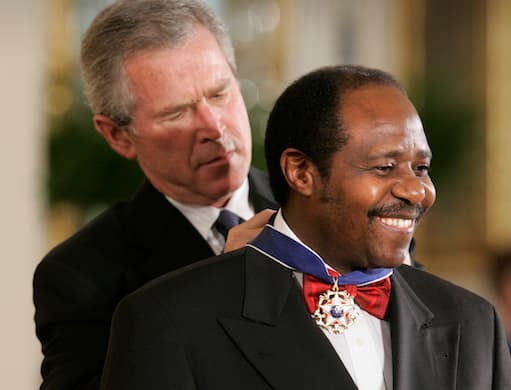Why Paul Rusesabagina Matters for America
Today, the 67-year-old hero of the Rwandan genocide sits jailed in Kigali as a political prisoner. He is denied adequate medical attention and proper legal representation.

Paul Rusesabagina is a modest man. In a room full of Washington A-listers, celebrities, and powerful policymakers, he doesn’t immediately stand out as a person of great consequence. He will tell you that he is not a hero. The truth, however, is entirely different.
Mr. Rusesabagina was the manager of the Mille Collines Hotel in Rwanda’s capital, Kigali, during the horrific genocide that engulfed that country in 1994. In the course of three months that year, about a million Rwandans — mostly of the minority Tutsi ethnic group — were slaughtered by their neighbors, friends, and even family members.
Something special happened amid this horror:. More than 1,200 people took shelter at the Mille Collines Hotel and all of them survived — every single one.
They survived because of Paul Rusesabagina. According to his daughter, Carine Kanimba, he “used words” to not only call for help but to persuade bloodthirsty Hutu-Power genocidaires to pass by the hotel and leave its residents unharmed. He welcomed anyone seeking shelter, regardless of their ethnicity.
In time, the world heard Paul Rusesabagina’s amazing story. A movie, “Hotel Rwanda,” brought him great attention and praise. The second President Bush awarded him the Presidential Medal of Freedom, America’s highest civilian honor.
The spotlight didn’t stop Mr. Rusesabagina from continuing to do what was right. As his home country of Rwanda, which came out of the genocide with new leadership and new hope, took a turn toward authoritarianism and harsh crackdowns on pluralism, he spoke up from his new home in America. He criticized the government for the assassination and persecution of political opponents. He was right to do so.
The government of Rwanda responded in 2020 by kidnapping Mr. Rusesabagina — flying him to Kigali from Texas under false pretenses, putting him through a sham trial, and sentencing him to 25 years in prison for supporting “terrorism.”
Human rights activists and legal associations have condemned the process as unfair. The U.S. government has expressed concerns over the kidnapping, fake trial, and imprisonment of this modest yet incredible man at the hands of a government gone sour and vindictive.
Today, the 67-year-old hero of the Rwandan genocide sits jailed in Kigali as a political prisoner. Mr. Rusesabagina is denied adequate medical attention and proper legal representation.
His two daughters, Anaise and Carine — one a permanent resident of the United States, one an American — are working to raise awareness of his plight and mobilize support for his release. Carine’s 2019 TED Talk on forgiveness tells another side of her father’s amazing story.
During the genocide, Anaise and Carine’s parents were killed. Mr. Rusesabagina and his wife found the two girls — then aged 1 and 3 — in a refugee camp after the fighting ended and adopted and raised them as their own.
Because of Anaise’s relentless lobbying, the House Foreign Affairs Committee recently adopted a resolution urging Rwanda to release Mr. Rusesabagina from prison on humanitarian grounds. Soon, the full House and Senate will be on record supporting a hero in his time of need.
Paul Rusesabagina’s case matters for two equally important reasons. The first is simply the merits of his life. He has proven himself to be the best of humanity — brave, modest, resolute. He has made sacrifices for the benefit of others and acts in the best interests of those around him. For these values alone he has earned our support and advocacy.
The second reason is that Paul Rusesabagina’s life stands as a symbol for the bigger challenges that confront America in the world. If Rwanda is allowed to continue to make a mockery of the rule of law and basic fairness to silence a global hero, then how will we challenge President Putin when he jails his political opponents or President Xi when he imprisons an entire ethnic group in China’s Xinjiang Province? The fight for Paul Rusesabagina’s freedom is critical to our values, and also very much in line with our national interests.
Several years ago, I had the privilege of attending a Washington dinner at which Madeleine Albright was honoring Vaclav Havel, the brilliant author of Czech resistance to the Soviet Union. Sitting next to me was a modest man who introduced himself simply as “Paul.” During a lull in the program, I asked about his background. When he replied that he was from Rwanda, I realized who he was — and that I was sitting next to the most important person in the room and, indeed, the city.

